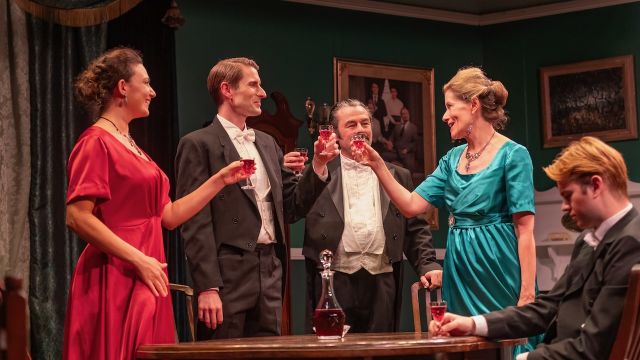An Inspector Calls
The Genesian Theatre Company celebrated “80 years of continuous theatre making” last year. In this, their 90th year they begin a new era as they move from the gracious old 19th century building in Kent Street that had been their home for many years to their new, purpose-built theatre in Rozelle.
The company has a history of producing many murder mysteries, so it is fitting that they have chosen J.B. Priestly’s 80-year-old classic mystery An Inspector Calls to launch their 2025 season … and show off the theatrical possibilities of their new home.
Though audiences might miss the brick walls and stained-glass windows of the old theatre, the new stage is perfect for a period drama set in a fire-lit turn-of-the-century dining room with velvet curtains, polished furniture, glittering glassware and spooky lighting and prop effects.
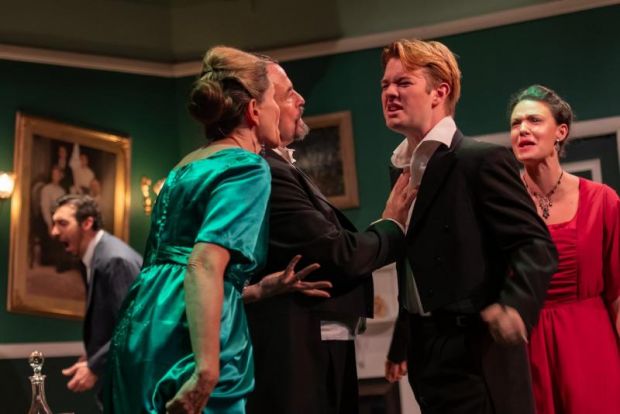
Directors Ali Bendall and Mark Bull have chosen a rich colour palate for the set which is matched by Susan Carveth’s costumes. Lighting and sound designer Michael Schell returns to provide the atmospheric eerie music and ghostly lighting effects for this, his 170th production for the Genesians.
Written in 1945, but set in 1912, An Inspector Calls is more than a murder mystery, as it also encompasses what director Ali Bendall and Mark Bull explain as the “timeless themes of social responsibility, class inequality, and the inter-connectedness of human actions”.
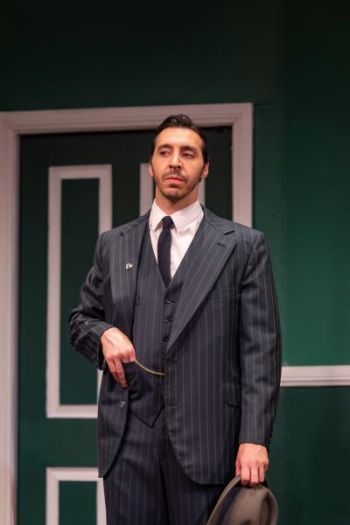
Priestly uses the interrogation technique of the time-conscious “Inspector Goole” to expose how the unconnected but selfish, insensitive actions of each of the upper class Birlng family have led to the eventual suicide of Eva Smith, a young lady once employed in Arthur Birling’s factory, but “let go” following her part in a strike.
Bendall and Bull have ensured the blocking and timing is in keeping with Priestly’s writing, allowing the characters to establish themselves quickly and strongly in the first scene, so that their subsequent unravelling by the “Inspector” reveals their social flaws. They have chosen an experienced cast, who assume the stance, presence and speech of the time and the “class” they claim to represent.
David M Bond plays Arthur Birling, an industrialist aspiring to greater things. Bond makes his Birling officious, self-important, even arrogant in his attempt to impress his daughter’s fiancé, the son of landed gentry and industry. He struts, poses, straightens his waistcoat, swishes his coat tails … and interrupts others condescendingly. Birling is the epitome of a haughty self-made man and Bond plays him well.
Sybil, his social-climbing wife, is played with similar haughtiness by Annabel Cotton. Cotton has a strong stage presence which she uses effectively to show Sybil’s conceit and over-confidence. This is especially evident in her foolhardy interview with the “Inspector”, where Cotton skilfully shows Sybil’s gradual disintegration as her own treatment of the dead woman is exposed.
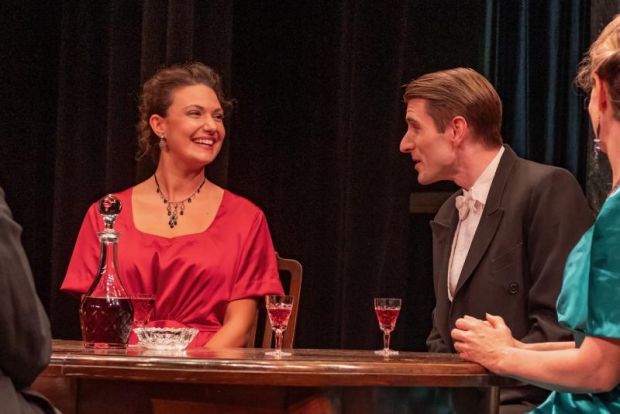
Rebecca Liquorish plays their recently engaged daughter Sheila. J.B.Priestly makes Sheila a little more socially aware than her parents and therefore more susceptible to Eva Smith’s story – and her own contribution to the girl’s downfall. Liquorish finds that compassion and empathy in an impressive performance that shows Sheila’s strength of character – and a conscience and that contrasts sharply with that of her arrogant parents and her fiancé, Gerald Croft, played by Simon Pearce.
Pearce shows both the superiority of the entitled in Croft’s character as well as his inherent weakness. He makes the character a little condescending and self-righteous – which he allows to fall away progressively as his indiscrete involvement with the young woman is revealed in the presence of his fiancée and her parents. It is interesting to see his demeaning attempt to clutch back his self esteem in the final scenes.
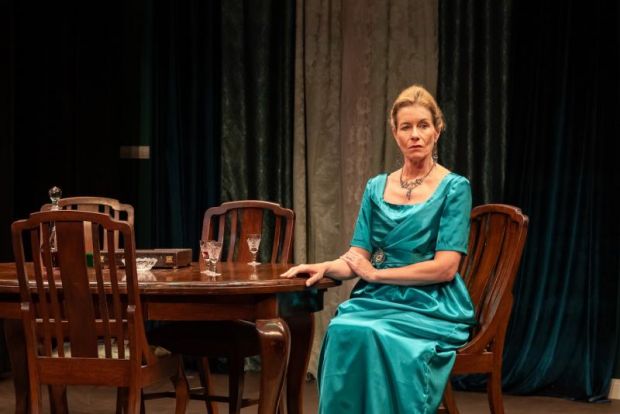
Sheila’s younger brother Eric is played with intuitive genuineness by Harry Charlesworth. Charlesworth finds the naivety and gullibility of the character and his youthful susceptibility to emotion, especially in the intimidating hands of Inspector Goole.
Goole’s formidable changes of approach and tone are carefully sustained by Vincent Andriano, who returns to the Genesian stage with another very taut performance. Andriano makes Goole imposing and edgy, constantly consulting his pocket watch as if haunted by some inexplicable constraint. He paces, then sits; he questions quietly, then erupts in in loud anger. He is relentless in his determination to expose the failings of each of his ‘witnesses’… and their guilty contributions to the awful suicide of the unfortunate Eva Smith.
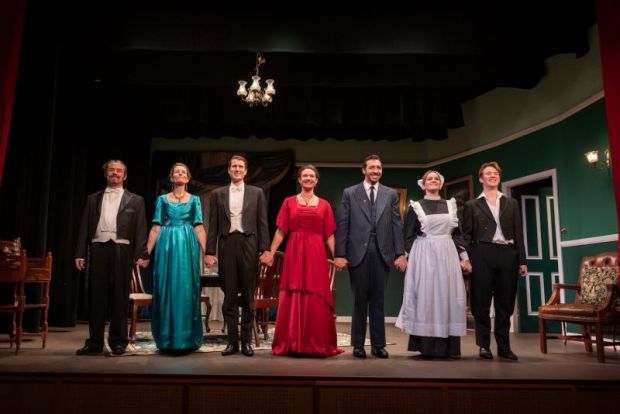
A guilt that does not last long once Goole leaves and Mr and Mrs Birling and Mr Croft start to question his identity and the authenticity of his accusations … until a phone message and a knock at the door re-introduces the maid Edna, played by Meredith Blee, who announces another Inspector is at the door …
Bendall and Bull have given this production the thought and time needed to realise the intrigue and social comment in Priestly’s very carefully constructed script and develop the seeming strengths and underlying frailties of his characters. The action is tight, the performances strong, the atmosphere tense.
A perfect opening to new venue and a new season!
Carol Wimmer
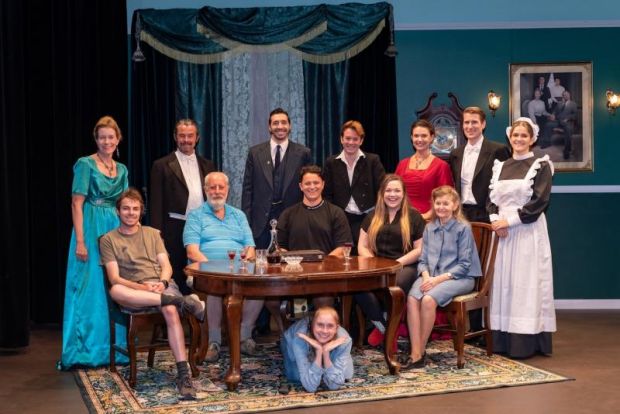
Subscribe to our E-Newsletter, buy our latest print edition or find a Performing Arts book at Book Nook.

